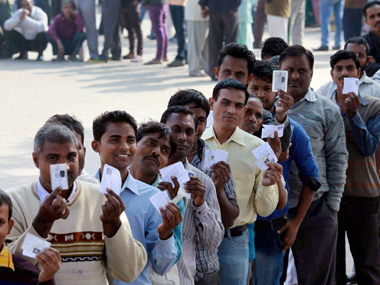New Delhi, Feb 7: Polling began this morning for the 70-member Delhi Assembly polls in which AAP and BJP appeared to be the main contenders.

The voting began at 8 AM at over 12,000 polling stations, of which 714 have been identified as "critical" and 191 "highly critical".
A total of over 1.33 crore voters are eligible to exercise their franchise. A total of 673 candidates are in the fray in the contest.
Over 64,000 police personnel had been deployed across the city to ensure free and fair polls.
The BJP, which is out of power in Delhi for the last 16 years, made a gamble by bringing in former Team Anna member Kiran Bedi into the party and made her its Chief Ministerial candidate which is said to have triggered discontent among the party leaders and rank and file.
The BJP strategy has been countered by Kejriwal-led AAP which has put up a spirited campaign in a bid to stop the Narendra Modi juggernaut that has been on a roll ever since the Lok Sabha election victory in May last year.
The Congress, which had ruled Delhi for 15 years till December, 2013 has been projected way behind AAP and BJP in pre-poll surveys. Some opinion polls have given AAP a clear majority while a few have predicted BJP's win.
The Burari constituency in North Delhi has a maximum of 18 candidates while the Ambedkar Nagar seat in South Delhi has the lowest number of contenders at four.
The Matia Mahal constituency has the largest number of electorate at 3.47 lakh while Chandni Chowk the lowest at 1.13 lakh.





Comments
Add new comment